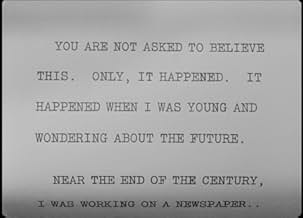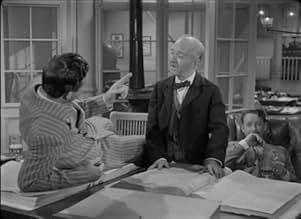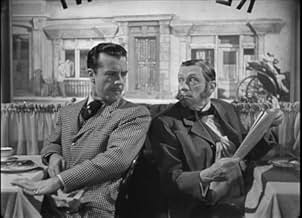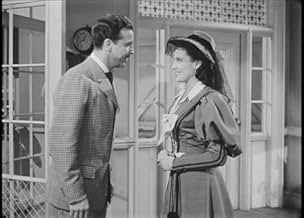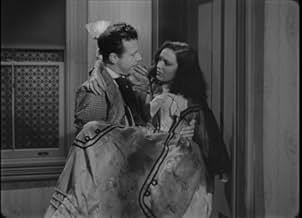Füge eine Handlung in deiner Sprache hinzuA young turn-of-the-century newspaper man finds he can get hold of the next day's paper. This brings more problems than fortune, especially as his new girlfriend is part of a phony clairvoya... Alles lesenA young turn-of-the-century newspaper man finds he can get hold of the next day's paper. This brings more problems than fortune, especially as his new girlfriend is part of a phony clairvoyant act.A young turn-of-the-century newspaper man finds he can get hold of the next day's paper. This brings more problems than fortune, especially as his new girlfriend is part of a phony clairvoyant act.
- Für 2 Oscars nominiert
- 2 Gewinne & 3 Nominierungen insgesamt
- Restaurant Owner
- (Nicht genannt)
- Show Spectator
- (Nicht genannt)
- Policeman
- (Nicht genannt)
- Racetrack Spectator
- (Nicht genannt)
- Wedding Witness
- (Nicht genannt)
- Gambler
- (Nicht genannt)
- Show Spectator
- (Nicht genannt)
Empfohlene Bewertungen
It won't take you long to ascertain the status of old "Pop" and why his sayings are so cryptic , but it's the prelude to a couple of days of impending headlines and deadlines which see Powell variously lose and recover, (with a raise!) his reporter job at the paper, witness a bank robbery as it happens and then be on the scene when the police catch said crooks the next day, save his new girlfriend from drowning, win and lose $60000 on the racetrack and lastly, inescapably it seems, be present at his own reported death.
All that stuff is lovely and engaging but the film gets dragged down somehow by some poor editorial choices by the director. For one thing the movie is framed by a pointless 50-years-after sequence which effectively tells you Powell's fate well in advance and secondly, too much time and space is given to Jack Oakie the magician father of Linda Darnell, for whom she acts as his mind-reading assistant in the act and with whom Powell becomes smitten at one of their shows. His personality is as loud as his outfits and he brings too much vaudeville slapstick to bear on proceedings. I think the film would have played a lot better if done more in the style of say, "It's A Wonderful Life' than "Arsenic And Old Lace" to borrow two titles from the master of the fantasy feature, Frank Capra.
I liked Powell and Darnell as the leads and especially John Philliber as the venerable, mysterious Pop, who himself ironically died within a year of the film's release but not Oakie or George Cleveland for the same reason, as the excitable newspaper editor, Mr Gordon.
Director Clair has a pleasingly light touch which this material requires but just seems to have become confused as to the best approach to adopt to make for a fully satisfying outcome.
The end result still pleases but with better oversight this could have been on a par with the best of this genre of movie, maybe even rivalling the charm of some of Capra's premier features.
Larry flirts with Sylvia and on his way back home, he overhears Pop on the street and the old man tells that he is waiting for him and gives a newspaper to him. Larry does not give much attention and puts the newspaper in the pocket of his jacket. On the next morning, he finds that the newspaper is an edition of the next day. Larry uses the information to scoop about a hold up in the opera house, becoming the prime suspect of Inspector Mulrooney (Edgar Kennedy). Larry dates Sylvia and Pop gives another edition of The Evening News of the next day. Larry becomes a successful reporter and is promoted and has a raise on his job. He plans to marry Sylvia and decides to find the winners of the horse race. But soon he also learns that he will die on the next day. Now he questions whether the future can be changed.
"It Happened Tomorrow" is a delightful and fantastic romantic comedy by René Clair. The plot is very funny and entertaining with a perfect combination of romance and comedy. Linda Darnell and Dick Powell have a stunning chemistry, and Jack Oakie is hilarious. The sequence when the gossipers see Sylvia breaking in her room through the external window dressed like a man and believe that she is having an affair is one of the funniest moments of this great film. My vote is eight.
Title (Brazil): "O Tempo é Uma Ilusão" ("The Time is an Illusion")
This early "Early Edition" is a classic film whose story is like one of the great "Twilight Zone" episodes complete with twists, irony and a lesson to be learned. In comparison to contemporary offerings it is nice to see a film that is both fun and intelligent. Though technically a drama, this film has plenty of comedy too.
One of my favorite actresses, Lynda Darnell ("Forever Amber"), co-stars along side Dick Powell and one of the great comedic side-kick actors of all time Jack Oakie. Comedy film buffs watch for Eddie Acuff (the mailman in the Blondie series) in an uncredited role.
Wusstest du schon
- WissenswertesThe opera singer "Melba", whose concert is robbed as part of the plot, is Australian soprano Dame Nellie Melba (1861-1931). Peach Melba and Melba toast are both named for her.
- PatzerIn 1896 Cigolini (Jack Oakie) shoos away a (horse-drawn) cabbie with the injunction, "23, Skidoo!" That phrase only became a popular fad in 1905, and there's no record of "23" even by itself as slang before 1899.
- Zitate
Pop Benson: News is what happens. What's the difference whether it happens 50 years ago... or tomorrow?
Lawrence 'Larry' Stevens: You mean Will happen tomorrow.
Pop Benson: No. Time is only an illusion! Look, March 18, 1875. To the people then, this was the future; wasn't it? Well, suppose we were all living on that date in 1875... and I arrived with this book. I can tell you everything that will happen.
- Crazy CreditsLike many films of the time, this one encourages theatregoers to support the war effort. The third screen of credits seen at the end says: "Make it Happen Tomorrow Buy Bonds and Stamps Today!"
- Alternative VersionenThere is an Italian edition of this film on DVD, "ORE X: COLPO SENSAZIONALE", re-edited in double version (1.33:1 and 1.78:1) with the contribution of film historian Riccardo Cusin. This version is also available for streaming on some platforms.
- VerbindungenReferenced in Allein gegen die Zukunft (1996)
- SoundtracksBelieve Me If All Those Endearing Young Charms
(uncredited)
Traditional Irish melody
Lyrics by Thomas Moore
[Sung by those gathered at the beginning]
Top-Auswahl
- How long is It Happened Tomorrow?Powered by Alexa
Details
- Laufzeit
- 1 Std. 25 Min.(85 min)
- Farbe
- Seitenverhältnis
- 1.37 : 1


